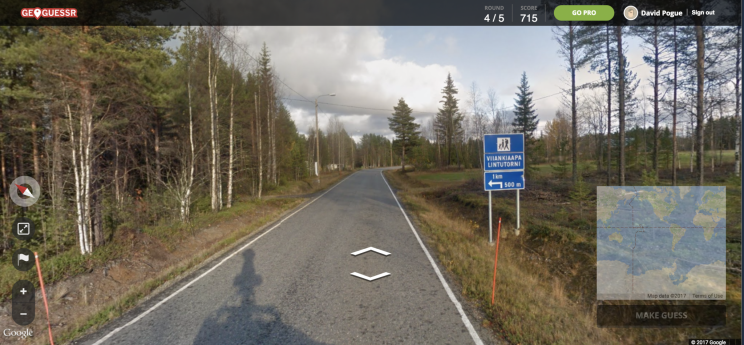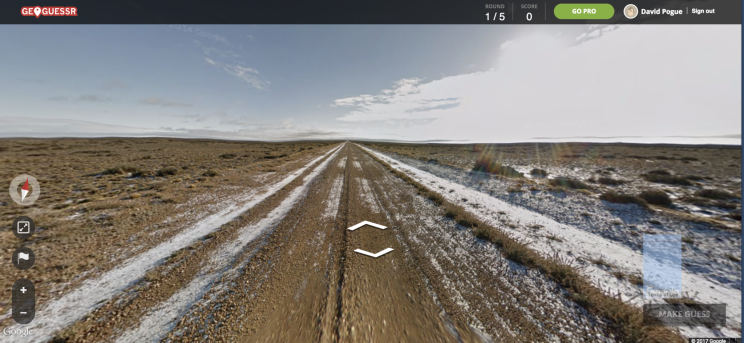I just discovered GeoGuessr, a free mystery game that will show you the world
My son Kell came home from his Tufts winter break bearing a gift: an introduction to Geoguessr.com. This free internet game has actually been around since 2013, but it was new to me—and maybe even to you.
You’ve heard of Google (GOOG, GOOGL) Street View, right? Google’s vans have spent the last 16 years driving the world’s streets, capturing 360-degree pictures of the world’s roads. So when you use Street View, you’re clicking along a photographic tour of every American or European road. It’s fantastic for checking out a neighborhood before you visit, seeing how ritzy someone’s neighborhood is, or practicing a trip you’ll have to make.
Well, GeoGuessr, which was written by a Swedish IT consultant named Anton Wallén, is built on top of Street View. When you start the game, it plunks you down—somewhere in the world. Your job is simple: Figure out where you are!

You’re looking for clues as you move along the road, turn around to look, or zoom in and out, using the arrow keys or the mouse.
Sometimes, you’re plopped down in the proverbial middle of nowhere. An unpaved road through barren fields, empty for many, many miles. How on earth are you supposed to figure out where you are?
Other times, you’ll have some clues right away. Maybe the white lines on the sides of the road are dashed instead of solid, telling you that you’re not in Kansas anymore (or even the United States). Maybe the cars sharing your road have really wide, skinny license plates—clearly a non-North American thing.
Maybe a certain kind of trees, bushes, or crops give you a hint. Sometimes, it’s the architecture of the buildings or the design of the cars that give away the region you’re in.
And occasionally, you strike gold: you spot a navigational sign that identifies the town you’re in, or a nearby one, or at least lets you know what language they speak here.

Now, you can play GeoGuessr however you like. But in our family, you’re allowed to Google your clues. You can translate a sign, for example, or even look up a phone number or a local political candidate you spot on a poster.
You might think that that kind of research kills the mystery, but it’s not quite that easy. OK, so you find a phone number on a billboard. You find out that it belongs to a plumbing company in an obscure town in Argentina. Well, great. But in GeoGuessr, once you think you know where you are (or you give up), you open a map of the world, zoom in, and click where you think GeoGuessr has dumped you.

But even if you’ve Googled up the name of the little town, how are you supposed to find that town on the map?
Once you guess, a results screen instantly shows you how close you were. You get 5,000 points if you’re on the nose, 0 points if you’re on the exact opposite side of the world, and anything between, depending on your proximity.

You play five rounds, racking up the highest score you can.
There are variations. For example, you can limit the quest to U.S. Cities, or European Stadiums, or Famous Places; none, in my view, are quite as exciting as the World version. There’s also a Pro version that lets you create your own maps. It’s $3 a month (presumably this is the business model). The Pro model is also supposed to eliminate ads, but guess what? In weeks of playing, I haven’t seen any ads!
The Virtues of GeoGuessr
GeoGuessr was a huge hit at this year’s annual Pogue multi-family holiday gathering (the assembled parents, siblings, and nieces and nephews of my wife and me). Using Apple TV, I broadcast my laptop’s screen to the TV so everyone could see. (There’s also a phone app version.)
The cool thing is that the entire family can play this game. Oldsters who’ve traveled can chime in with what they know about the world. People who haven’t traveled can use their intellect. And even kids can spot clues.
The fundamental appeal of GeoGuessr is, of course, that you’re solving a mystery—a real-world mystery. But secondarily, everyone is learning things. You pick up facts and cultural features, of course, but you’re also seeing the world at ground level. Even years into the existence of Street View, most people still picture other countries as maps on a page—not living, breathing, vibrant places with characters of their own. Play GeoGuessr enough times, and you begin to realize how vague a picture you had of other places in the world.
Among other things, you learn that a lot of this planet is hot and dry.

And that’s even without seeing anything in China, Russia, the Middle East, or most of Africa. Those are places that Google’s Street View vans aren’t allowed to trawl (thank you, nervous governments!), so those are places you won’t be dropped in GeoGeussr. That’s a colossal disappointment.
But there’s still a lot of world left, a lot to see, a lot to learn, and a lot to share with your family and friends. You find yourself imagining what it’s like to live in these other places. You learn about the little things that define a place. You exclaim about the weird little design standards that have emerged in other societies.
It’s an amazing game, it’s free, and it’s great for big or little groups. And if playing this game makes the rest of the world seem just a little less foreign and scary, well, I’d say there’s no better game for the world to play right about now.
David Pogue, tech columnist for Yahoo Finance, welcomes non-toxic comments in the Comments below. On the web, he’s davidpogue.com. On Twitter, he’s @pogue. On email, he’s poguester@yahoo.com. You can read all his articles here, or you can sign up to get his columns by email.

 Yahoo Finance
Yahoo Finance 
